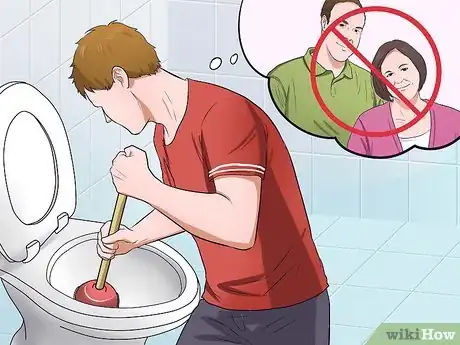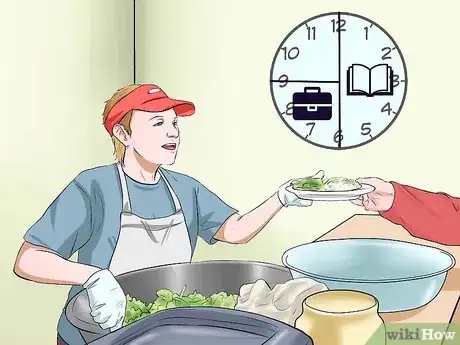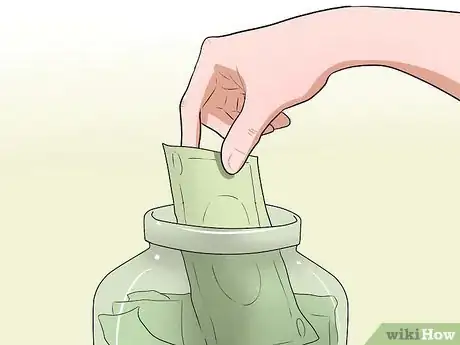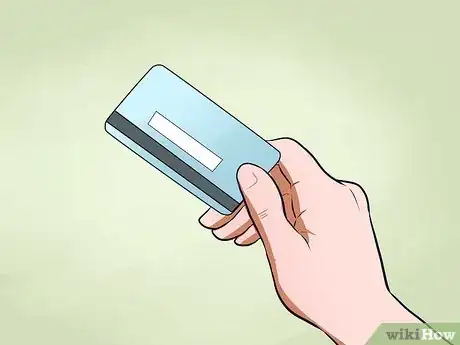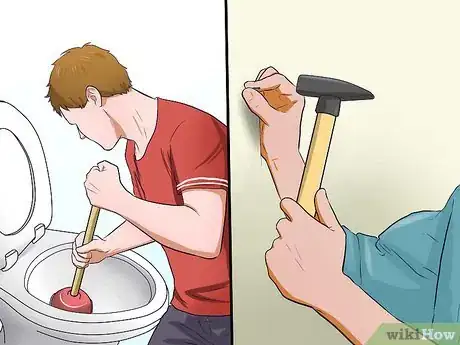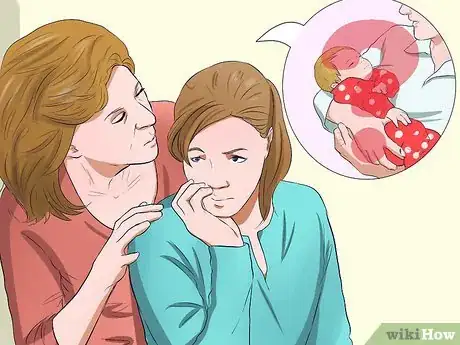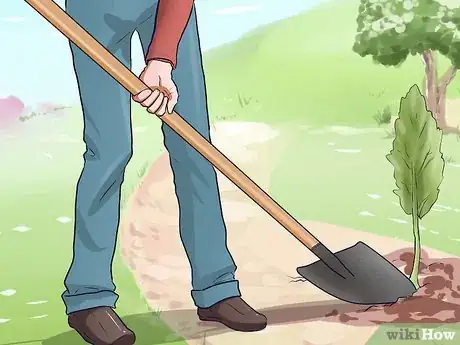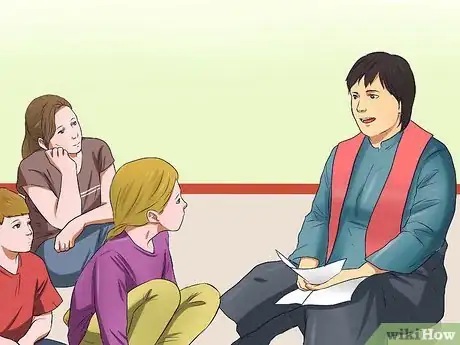This article was co-authored by Michelle Shahbazyan, MS, MA. Michelle Shahbazyan is the Founder of The LA Life Coach, a concierge life, family, and career coaching service based in Los Angeles, California. She has over 10 years of experience with life coaching, consulting, motivational speaking, and matchmaking. She has a BA in Applied Psychology and an MS in Building Construction and Technology Management from Georgia Tech University, and a MA in Psychology with an emphasis on Marriage and Family Therapy from Phillips Graduate University.
There are 8 references cited in this article, which can be found at the bottom of the page.
This article has been viewed 239,123 times.
If you feel like you're not really sure how to do this whole adulthood thing yet, you're definitely not alone. Transitioning from teenager to young adult is exciting, but it's also confusing and scary. The good news is that there's a bright light at the end of the tunnel. To help you reach it, we've rounded up tips to make transitioning into young adulthood easier, less overwhelming, and even fun.
Steps
Moving Toward Stability
-
1Accept the challenge. You’ve probably heard many grumpy adults tell you that your generation is ungrateful and immature. This attitude is, like your becoming a young adult, just another natural transition in life. Their generation (and each before it) was filled with 18 year olds who didn’t want to grow up. Though this transition has always been difficult for humans, it is still very important to accept the challenge. Life isn’t always enjoyable, but maturing proactively can make it a little easier.
-
2Learn to respect your parents (or your guardian). This is important, firstly, because they are probably the most emotionally and financially equipped people to offer help when you need it. There are also larger reasons for respecting your parents. You have a lifelong bond that can be an incredible source of strength for everyone involved. Sure, you may have quarreled while you were growing up, but it’s time to do the adult thing and put your differences aside.Advertisement
-
3Find mentors. The emotional and daily struggles you have as a young adult have been around forever. You’re not the first person to experience them, so check in every now and then with an adult you look up to. They can help you through problems and offer advice on how to ‘be an adult’ in a given situation.
- Having a mentor to talk to is also an important part of maintaining mental health. The early adult years are when you are most susceptible to showing signs of mental illness.[1] Let someone help you keep your blossoming feelings under control.
-
4Research and explore career options. The key to surviving the work culture of the 21st century is forgetting the clichéd question “what do I want to do for the rest of my life?” Almost no one these days will work for one company their entire life, much less have anyone job title. Many jobs that are available right now might become obsolete in the future. The best thing to do at 18 years old is think about general tasks you enjoy, and environments you enjoy being in. See this guide for a detailed description of the process of choosing a career.
- For example, if you keep your room tidy and keep track of all your expenses, you may enjoy a job in logistics or data management.
- Your ideal work environment may be as simple as indoor or outdoor. Or, for example, if you enjoy concerts, you should look into careers in audio engineering or event planning.
- You shouldn’t forget about your teenage dreams and hobbies, but most people aren’t going to become successful rock stars. Consider putting off spending too much time on unrealistic dreams until they are a viable way to earn a living. If you do want to follow your dreams, you can try following your dreams in a more "scaled down" and realistic fashion. For example, you may want to become a rock star, but think about starting a band and playing in your local community at a local coffee shop or lounge, etc.
- Getting a part time job while you explore your career options is a great idea. Just don’t get complacent with a job that doesn’t fill you with self-respect just because it puts a few bucks in your pocket.
-
5Look into ‘adult’ hobbies. It is important to have fun, but you should start thinking of ways to enjoy the world as an adult. There is a world of culture that you may have previously found dull or uninteresting. Now that you have matured some, try those activities again and see what all the rage is about – there is probably a reason ‘adult’ hobbies have been around so long.
- For example, try to spend less time watching cartoons and more time reading.
- Or, try going to a music concert that is not rock, hip hop or pop music.
- You don’t need to force yourself to tolerate activities you still don’t enjoy, but try to expose yourself to them and see how you like them.
-
6Move into an apartment you can afford. If you live in an area that allows you to move out of your parents’ house, do it! You may have to have roommates the first few years, but see that as an opportunity. Unlike high school friends, who often move in opposite directions, the friends you make as a young adult are probably there to stay. Roommates you have as a young adult can become lifelong friends. You will learn to be mature and responsible. Check out this guide for more on choosing an apartment.
- Look at the neighborhood. You want to factor in accessibility, safety, public transportation, and nearby amenities.
- Make a budget. After rent, utilities, renter’s insurance, and any other housing related expenses, you shouldn’t be spending more than one-third of your monthly income.
- Find roommates at a similar place in life. You may be able to successfully live with older or younger roommates later, but keep your life more simple by rooming with like-minded people in this phase of your life.
- If you’re still in high school, you shouldn’t move into an apartment just yet – this advice is for a little later.
-
7Make short-term and long-term goals. Think about where you want your life to be in five years. This will be important in giving your life a sense of direction, but don’t feel bound to it. As the saying goes, life is what happens when you’re busy making other plans. Therefore, write down where you want to be in a few months, or next year. This should be a smaller, more achievable goal that will make your daily life more enjoyable.[2]
- Long-term goals involve personal relationships, whether or not to attend college, being in an ideal career or job title, etc. These should be something you strive for, so making a plan is a good idea. However, be aware that your plan will change. For example, marriage may happen when you don’t expect it to, and not happen when you want it to. Be ready to roll with the punches.
- Short term goals may simply be, for example, that you want to start a weekly exercise regimen by next summer. Or, you may want to simply get a part time job in the next couple months while you explore career options.
Being a Student in the Adult World
-
1Ask for little to no allowance. Students can’t work enough to cover all college and living expenses in today’s economy. However, you should limit how much you’re in debt, both to banks and to your parents. Even though they may not expect you to pay them back, this ‘debt’ will linger in your subconscious. Start learning budgeting and pragmatism by limiting how financially dependent you are on your parents.[3]
-
2Accept advice from your parents. Your parents have been around longer than you have, and may have even attended college. Let them suggest time management and organizational skills while you are a student. Though they may not personally know your professors, they have come across many types of people in their life, and may have helpful advice for you.
- Parents may be a good source for relationship advice. Now that you’re a little older and more or less on your own, they may be able to identify with your relationship problems better than a few years ago.
- Seek advice from your parents about your resume. It is never too early to begin racking up experiences that will help you get jobs and promotions, so ask them what you should be doing in addition to school.
-
3Go out and live your own life. Though listening to your parents is important, take this time to find yourself. Don’t simply parrot their opinions around your friends, and force yourself to emulate their daily routine. Do some critical thinking about what you believe and how you want to live your life. The more proud parents may not appreciate this, but they should respect you for it later in life.
-
4Solve problems yourself. You will make mistakes as a young adult – everyone does. The important part is to solve the problems yourself, with as little aid from your parents as possible. Of course, it’s ok to ask their advice. However, calling your dad when you clog the dorm toilet is not a good way to solve the problem. Get a plunger and fix it yourself.[4]
- This extends to much more serious problems than a clogged toilet. If you didn’t plan your budget well, and are running out of money a month too early, try to find a way to solve the problem. Consider getting a short-term part-time job or checking the classifieds for little gigs.
-
5Treat classes and homework like your job. While you should be developing adult skills during your college years, the reason you’re there is to learn. Go to class on time, speak up, and respect the professor. They will be writing you recommendation letters in a few years. A high GPA can come in very handy down the road in ways you never expected.
- For example, if you decide to go back for a graduate degree later on, having put in the effort to get a 3.5 GPA instead of a 2.5 can be a real life saver.
-
6Try out keeping ‘adult’ hours. Waking up at 6am-7am and going to bed at 10pm-11pm is not for everyone. However, this is a natural schedule most adults eventually gravitate toward. It is also the schedule you will probably need to abide by if you get a full time job one day. Make the transition easier on yourself by getting in this rhythm when you have fewer responsibilities early in the day.
- It is easy for many college students to schedule all classes in the late morning, at the earliest. Try giving yourself a reason to get up earlier in the day by signing up for the earlier courses instead.
-
7Consider getting a part time job. If you are taking a full load of courses, this may not be very doable. However, it is a good way to make the burden of loan debt and borrowing money from your parents easier. It also builds your resume with actual work experience, even if it is unrelated to the career you envision. Finally, a job teaches you important interpersonal and time management skills that you will need for the rest of your life.
Developing Financial Responsibility
-
1Get a job. If you don’t go to college immediately, you need to start building your personal wealth. It is a good idea to go ahead and get a part-time job, even as you search for something you would enjoy more. It is easy for job searches to drag on much longer than you intend, and you can always quit a little part-time job.
- Getting a job as a restaurant server is fairly easy, and quick turnover is expected in that industry.
- Other service industry jobs like cashiering are easy to get and relatively painless to quit.
- Who knows, this little job may open up a new world to you that you want to work in.
-
2Be grateful for the work you have. In the internet age, machines do much of our work for us, limiting the number of jobs available. You may only have a crappy job right now, and think you deserve much more. You probably do deserve more, but look at this period as putting in your time. The best way to get promoted or impress your bosses is to put in a hard day’s work for your own sake if no one else’s.
- Look at the part-time job for what it is – a way to pay the bills and save up some money while you figure out what you want to do with the next part of your life.
- Try living day-to-day if you hate your job. If it was a beautiful day and a customer gave you positive feedback, put today in the ‘win column.’
- Being grateful doesn’t mean you should accept your unenjoyable job indefinitely. Look around for openings at night, and apply to jobs you think you won’t get. If you don’t apply for these jobs, you’ll never have the possibility of getting lucky with a job offer from your dream company.
-
3Start saving money. Putting part of your paycheck into your savings account is going to be useful down the road when you want a house or car. The best way to save money is to keep track of all of your income and expenditures. Give yourself a weekly budget for food and outings, and stick to it. You can even itemize trips to see family and friends if you know how much you’ll spend on gas and food.
- If your paycheck doesn’t automatically subtract income tax, put away some money every month for this. You should be saving somewhere between 20% and 30%, depending on your tax bracket.
-
4Consider getting a credit card. If you are relatively stable, this is a good way to build good credit. However, it is also a liability if you are a student or don’t make enough money to add an extra bill each month. After all, you build credit just by paying your other bills, like rent and your car payment. Since only half of people under 25 in many areas get credit cards, whether or not you should depends on your situation. Do some budgeting and ask your parents and mentors what they think.[5]
-
5Limit how often you go out. Getting out of your parents’ house means you have less supervision and only self-imposed curfews. It’s easy to start going out 4 nights a week, or more. However, this will likely become expensive and get in the way of performing well in your job. Furthermore, developing early alcohol dependence may set the stage for abuse later in life. Try not to go out more than once or twice a week.
-
6Start buying more groceries. You were probably used to having free groceries at your parents’ house and going out to eat otherwise. This is an expensive and generally unhealthy way to live. Force yourself to buy groceries, and plan on cooking them at home to save money.
- Buy fresh fruits and vegetables. Starting adulthood with a healthy diet is important to form good habits and a good relationship with food.
-
7Make coffee at home. This is more of a metaphor for making food or doing activities at home that are much more expensive elsewhere. You can, for example, pick up a deluxe coffee on your way to work one day. However, coffee by the pound is much cheaper, and can be made to taste better.
- As far as activities go, consider seeing movies at home rather than going to the movie theater every time, for example. The more you commit to outings, the more time and money you will lose.
Becoming a Role Model
-
1Learn to be more self-sufficient. Too many young adults can’t perform basic household tasks. Fixing the toilet and checking the oil in your car are basic tasks you should know how to do. This can-do attitude will transfer into your workplace. You will find that your supervisors will be much more impressed with someone who knows how to do random little things that help the office from day to day. [6]
- This could mean fixing a squeaky chair or identifying a serious problem with the company truck’s hydraulic system.
- Being handy at home also helps you avoid unnecessary repair expenses.
-
2Take responsibility for your actions. You don’t have the shelter of people treating you like a kid anymore. You will need to make decisions carefully and for good reason. Afterwards, accept the consequences whether they are positive or negative. Apologize if you made a mistake, but focus on not making that mistake again. Older adults will respect you for this.
-
3Learn about the ‘status quo.’ You may not agree with the way something is done, but ask your parents or mentors why it is the way it is. You don’t always need to blindly accept the world as it is. However, this is a ‘pick your battles’ situation. Reinventing the wheel every time you walk out the door will make it impossible for you to actually live your life.
- For example, you may not like paying local taxes. However, this is an important part of maintaining basic services and infrastructure. Get involved in local government to learn more about why the laws and regulations are the way they are.
- You also may not like that you are expected to get married and have children, especially in more conservative and family orientated communities (think small town and suburban America). Talk to your parents about how and why they eventually came to terms with having children.
-
4Be active in your community. Part of being an adult is shaping a better future. This involves community service and caring about education. Volunteer at your local school or community center, or find a way to be a role model for a younger teen or child.<[7]
-
5Share what you’re good at. Your hobbies from childhood will not likely become your career, but that doesn’t mean you need to quit doing them. If you are good at a hobby, sharing it with the community is a good way to give back. Find ways to show the world your talents.
- For example, if you were in orchestra growing up, audition for community orchestras as an adult.
- Or, if you were in boy scouts, volunteer as a troop leader.
- If you are good at public speaking, volunteer to give children’s sermons at church, for example.
-
6Dress like you respect yourself. Wearing more than sweats every day conveys a message to others and boosts your self-confidence.[8] Of course, you shouldn’t be uncomfortable or dress in outdated attire. There are, nonetheless, noticeable perks of not being the laziest dresser in the room. Wear a basic pair of pants and shoes with laces on casual days, and emulate those around you at work.
-
7Remember to laugh. After all this, it is important to remember that being an adult isn’t such serious business. Find hobbies that make you happy, and play! Sports, board games, and just running are perfectly acceptable activities for adults to have. Remember to really punch the clock at the end of the workday, and try to be a kid every once in a while.
- Turn off the TV.[9] Passive activities like this don’t stimulate your brain, and are not as rewarding as other ways of having fun.
-
8If you don’t know how to have fun, think of how you did it as a kid. Doing little craft projects or playing video games isn’t illegal now that you are an adult.[10]
- Think about fun ways to exercise. Since you won’t have as much time to have fun and get exercise, combining the two is a good idea. Play sports in your community or find a running buddy. This will keep you from having to double book yourself for exercise and social events as well.
- Engage with fun art forms. Try out painting, or get into art house films. It is easy to turn art into a fun hobby.
References
- ↑ https://www.nami.org/Find-Support/Teens-and-Young-Adults
- ↑ Michelle Shahbazyan, MS, MA. Life Coach. Expert Interview. 18 March 2020.
- ↑ https://www.healthychildren.org/English/ages-stages/teen/Pages/Next-Stop-Adulthood-Tips-For-Parents.aspx
- ↑ https://www.healthychildren.org/English/ages-stages/teen/Pages/Next-Stop-Adulthood-Tips-For-Parents.aspx
- ↑ https://www.citizensadvice.org.uk/debt-and-money/borrowing-money/credit-cards/choosing-and-applying-for-a-credit-card/
- ↑ https://positivepsychology.com/self-reliance/
- ↑ https://health.gov/our-work/nutrition-physical-activity/dietary-guidelines/previous-dietary-guidelines/2015/eat-healthy-be-active-community-workshops
- ↑ https://health.gov/our-work/nutrition-physical-activity/dietary-guidelines/previous-dietary-guidelines/2015/eat-healthy-be-active-community-workshops
- ↑ https://www.helpguide.org/articles/mental-health/benefits-of-play-for-adults.htm
About This Article
To act like a young adult, learn to respect your parents and listen to their advice, even if you disagree with it. If you want more independence, look for a part-time job to earn your own money. Later, when you’ve finished high school, try to find an apartment you can afford and consider getting a credit card. In your new home, develop self-reliance by learning how to perform simple tasks, like changing the oil in your car or clearing a blocked toilet. To learn how to be an adult student at college, and for tips on finding the right career for you, keep reading!











